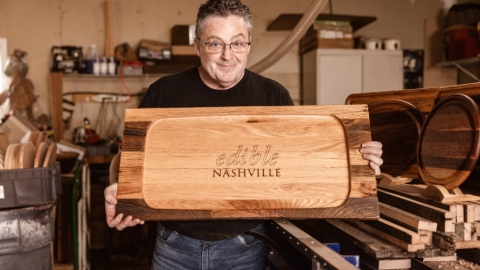Artisans We Love: John Phillips and Primeaux Knives
The success of John Phillips’ artisanal cutlery brand, Primeaux, results from the intricate layering of more elements than can be found in the feather-patterned Damascus finish on a mini-cleaver of VG10 stainless steel. That is to say, in the technical jargon of a self-trained East Tennessee bladesmith, that a lot of science, study and hustle go into making a luxury knife.
For Phillips, the journey to entrepreneurship started when he was a child in Asheville, N.C. “I was an Eagle Scout, and knives and tools were always a part of my growing up,” he says. But it was a high school job in a restaurant kitchen in Goodlettsville, Tenn., that introduced Phillips to knives as artistic instruments for expression. “Chefs brought their own knives to work and nobody was allowed to touch them. I was intrigued,” Phillips remembers. “That’s when a knife became more than a tool. It became more like a paintbrush.”
Phillips headed to the University of Tennessee, Knoxville, where he studied fine art. He worked in more restaurants, eventually designing and building restaurant spaces. After working on big projects with big budgets, Phillips wanted to get back to a craft with greater intricacy. He always liked knives, so he started hammering on metal and dabbling in metallurgy. He experimented with steel at different temperatures and explored different edge geometries for sharpening blades.
He was still working out of his Knoxville garage, selling a couple knives a month, when he brought his Phillips Forged wares to the Porter Flea makers market in Nashville, and Chef Sean Brock stopped by his booth. That’s when things changed. Brock gave Phillips’ knives a shout-out on Instagram and included photos in his book, South. Blackberry Farm found Phillips Forged too and began a collaboration through which the luxury resort sells Phillips’ knives. Perhaps most significantly, Phillips earned a slot on the History Channel show Forged in Fire, where he won top honors.
Requests for knives were piling up, and Phillips was scrambling to fulfill orders. Then came the pandemic. Phillips expected things to grind to a halt; instead, people started cooking, and many ordered knives. Meanwhile, some of his friends in East Tennessee were out of work, so he hired them.
The University of Tennessee sent a group of engineering and business students to study Phillips’ enterprise to see if the potential existed to scale up the business. The answer was yes. Suddenly, Phillips had a performance track record and the financial analytics to help him convince bankers he was a good bet. That’s when the newly named Primeaux began to look like it does today, with Cameron Kite and Phillips, along with Phillips’ wife, Kate Wiggeringloh, producing 20–30 knives a month with computerized cutting tools in a modernized workshop inside a converted forklift warehouse.
By that point, Phillips had honed his craft on a thousand one-of-a-kind pieces, which helped narrow his designs to a signature Primeaux handle. The defining characteristic of a Primeaux knife is a pinched-grip bolster — that is, the juncture where the handle meets the blade has two thumb indentations at the top to guide the hand into a secure grip. Other highlights of a Primeaux knife include a rounded spine and a rounded choil, where the blade meets the bolster. “There are no spots that rub you in a weird way,” Phillips says.
While holding constant the signature ergonomic detail of the pinched grip, Primeaux can vary blade shape and finish, as well as bolster and handle materials. The permutations are endless. Once a month, Primeaux loads a selection of unique offerings onto the website, and they sell out fast, with prices usually ranging from $300 to $1,500 per knife.
Buyers who want to customize a knife can email Phillips directly to select blade, bolster and handle details. Phillips can even incorporate specific woods and materials of personal significance to create inheritable pieces. “I try to make it more than just a knife,” Phillips says.















